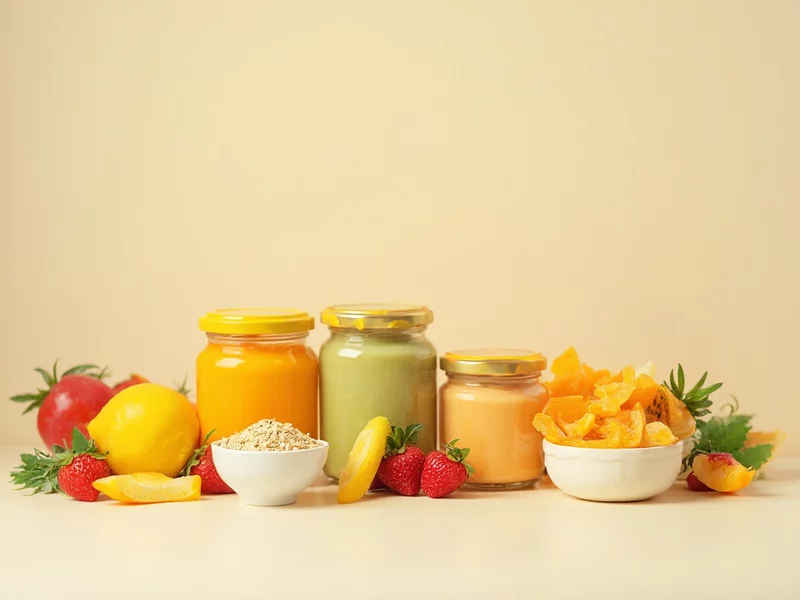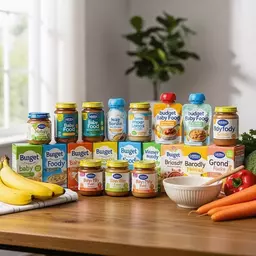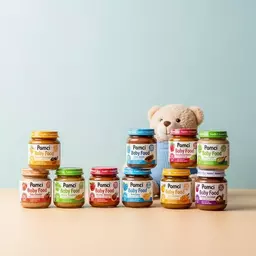Nutrient-Rich Baby Foods Guide

Starting with your baby's nutrition can feel overwhelming, but understanding their specific needs is the key to fostering healthy eating habits. As you venture into the world of baby food, consider how each meal contributes to their growth and development.
What You Will Learn
- Nutrient-rich foods are essential for supporting brain development and physical growth in babies.
- Australian nutritionists recommend introducing one food at a time to monitor for allergies and reactions.
- Iron-rich foods are crucial for babies aged 4-6 months, while healthy fats and proteins become important as they grow.
- Creating a positive eating environment encourages healthy eating habits and a lifelong appreciation for diverse flavors.
Nutrient Spotlight: Essential Foods for Baby's Development
This visual highlights critical nutrients and food groups vital for babies at different developmental stages, along with key approaches recommended by nutritionists.
Why Nutrient-Rich Foods Matter
- ✓ Supports Brain Development (Omega-3s)
- ✓ Enhances Physical Growth (Proteins, Vitamins)
- ✓ Boosts Immunity (Nutrient-dense foods)
Aussie Nutritionist Guidelines for Starting Solids
- ✓ Introduce One Food at a Time
- ✓ Focus on Iron-Rich Foods (6 months+)
- ✓ Aim for Variety in Tastes & Textures
Understanding Baby's Nutritional Needs
- ✓ Iron-rich options (4-6 months)
- ✓ Proteins & Healthy Fats (6-12 months)
- ✓ Diverse flavors and textures
Key Nutrients: Vitamins & Healthy Fats
- ✓ Vitamins A, C, D, E for immunity & bones
- ✓ Healthy Fats for brain development & energy
Understanding Nutrient-Rich Baby Foods for Each Developmental Stage
As parents, we want the best for our little ones, especially when it comes to their nutrition. The journey of introducing nutrient-rich baby foods is crucial for their growth and development. Understanding why these foods matter is the first step in ensuring our babies get the essential nutrients they need!
Every stage of a baby's development requires specific nutrients. From building strong bones to supporting brain development, the right foods can make a significant difference in your child's health. As a nutrition enthusiast, I can't emphasize enough the importance of starting with quality ingredients tailored to your baby's needs.
Why Nutrient-Rich Foods Matter for Babies
Nutrient-rich foods are vital for babies as they support healthy growth and development. During the first year, babies undergo incredible changes, and their bodies require various nutrients to keep pace. Here are some reasons why these foods are essential, aligning with information from the USDA's guidance on infant feeding:
- Supports Brain Development: Nutrients like omega-3 fatty acids contribute to cognitive development.
- Enhances Physical Growth: Proteins and vitamins aid in building strong muscles and bones.
- Boosts Immunity: Nutrient-dense foods help strengthen babies' immune systems, protecting them from illnesses.
By offering a variety of these foods, you're setting the foundation for your child's health. It’s essential to be attentive to their specific needs as they grow!
How Australian Nutritionists Recommend Starting Solids
When it comes to starting solids, Australian nutritionists have clear guidelines that help parents navigate this exciting transition. At around six months, babies are generally ready to explore new flavors and textures, following recommendations similar to those found in the Dietary Guidelines for Americans. Here’s what experts recommend:
- Introduce One Food at a Time: Start with single-grain cereals or pureed fruits and vegetables to monitor for allergies.
- Focus on Iron-Rich Foods: Foods like fortified cereals and pureed meats can help meet your baby's iron needs.
- Aim for Variety: Gradually introduce different foods to expose your baby to various tastes and nutrients.
As a parent, you can turn this into an enjoyable experience! Take time to observe your baby's reactions and preferences, and don’t hesitate to experiment with new flavors while keeping their nutritional needs in mind.
Top Nutrient-Rich Baby Foods for Different Stages
Now that we understand the significance of nutrient-rich foods, let's dive into some of the best options for your baby at different developmental stages. Choosing the right foods can help ensure your little one receives the nutrients they need to thrive!
Pro Tip
Did you know? One great way to encourage your baby to enjoy a variety of nutritious foods is to involve them in the preparation process. Letting them safely explore textures and smells can create a positive association with healthy eating. Consider making purees together or offering simple finger foods that they can pick up and experiment with!
Frequently Asked Questions About Baby Nutrition
Q: Why are nutrient-rich foods so important for babies?
A: Nutrient-rich foods are crucial because they support rapid brain development, enhance physical growth by providing essential proteins and vitamins, and boost the baby's immune system to protect against illnesses. These foods lay the foundation for a child's lifelong health.
Q: When should I start introducing solid foods to my baby?
A: Australian nutritionists generally recommend starting solids around six months of age. This is when babies are typically ready to explore new flavors and textures, and their iron stores from birth begin to deplete.
Q: What are the guidelines for introducing new foods to babies?
A: Experts advise introducing one new food at a time, especially iron-rich options like fortified cereals and pureed meats, to easily monitor for any allergic reactions. Gradually aim for a variety of tastes and textures to expose your baby to diverse nutrients.
Q: Which key nutrients are essential for babies at different stages?
A: For babies aged 4-6 months, iron-rich options are crucial. As they grow (6-12 months), proteins and healthy fats become increasingly important. Throughout all stages, essential vitamins (A, C, D, E) and healthy fats are vital for immunity, bone health, brain development, and energy.
Q: How can I encourage healthy eating habits in my baby early on?
A: Encourage healthy eating by creating a positive mealtime environment, involving your baby in food preparation (safely exploring textures and smells), offering a colorful variety of fruits and vegetables, and encouraging self-feeding with safe finger foods as they develop fine motor skills. These practices foster a positive relationship with food.
Key Takeaways on Nutrient-Rich Baby Foods
As we explore the world of nutrient-rich baby foods, it’s essential to understand your baby’s unique nutritional needs. From the moment they start solids, every meal can contribute to their growth and development. I believe that by making informed choices, we can create a solid foundation for their future health!
Different stages of development require specific nutrients. During the early months, iron is crucial, while healthy fats and proteins become more important as your baby grows. Keeping this in mind will help you select the best options for your little one.
Understanding Your Baby’s Nutritional Needs
When introducing new foods, it's vital to pay attention to your baby's reactions and preferences. Every child is unique, and their nutritional needs may vary based on their age, activity level, and health. One way to ensure they're getting all the necessary nutrients is to offer a wide variety of foods, as highlighted by the CDC's advice on early nutrition.
- Focus on iron-rich options for babies aged 4-6 months.
- Introduce proteins and healthy fats around 6-12 months.
- Incorporate diverse flavors and textures to keep meals interesting.
By following these guidelines, you’ll help your baby develop a taste for healthy options early on. Remember, the goal is to make mealtime a joyful and nurturing experience!
Encouraging Healthy Eating Habits Early On
Teaching your baby about healthy eating starts at a young age. One of the best gifts we can give them is the ability to appreciate a variety of flavors. By doing this, we can shape their eating habits for life. It’s all about creating a positive relationship with food!
Involving your baby in mealtimes—like letting them explore different textures—can foster their interest in healthy eating. As you introduce new foods, try to maintain a fun and relaxed atmosphere. Here are a few tips to encourage healthy choices:
- Make mealtimes family-oriented to create a supportive environment.
- Offer a colorful variety of fruits and vegetables.
- Encourage self-feeding with safe finger foods as they grow.
These practices not only promote healthy eating habits but also help in developing fine motor skills. I'm excited to see how your little ones respond to these nutritious options!
The Importance of Essential Vitamins and Healthy Fats for Babies
Essential vitamins and healthy fats play a vital role in your baby's growth. Vitamins A, C, D, and E are crucial for their immune system, vision, and bone health. Likewise, healthy fats support brain development and energy levels. Incorporating sources of these nutrients in their diet can set them up for success!
As a parent, I encourage you to read labels and opt for baby foods that are high in these essential vitamins and healthy fats. When you provide nutrient-dense meals, you are nourishing not just their bodies but also their futures!
Engage with Us and Share Your Experiences
Join the Conversation on Nutritional Choices for Babies
I’d love to hear your thoughts on introducing nutritious foods to your little ones! At Best Baby Food Australia, we thrive on connecting with parents who share the same passion for healthy eating. Join the conversation and let’s support each other in making the best choices for our children.
Share Your Tips and Recipes with Other Parents
If you have favorite baby food recipes or tips, don’t hesitate to share them! By exchanging experiences, we can all learn and grow together. Whether it’s a simple puree or an exciting finger food, every little contribution counts!
Your insights could inspire another parent to try something new, making the journey of feeding our babies a collective adventure. Let’s keep the dialogue going and support each other in this incredible journey of parenthood!
Recap of Key Points
Here is a quick recap of the important points discussed in the article:
- Nutrient-rich foods are essential for supporting brain development, physical growth, and boosting immunity in babies.
- Australian nutritionists recommend starting solids around six months, focusing on iron-rich foods and introducing one food at a time to monitor for allergies.
- It's important to incorporate a variety of flavors and textures to keep meals interesting and encourage healthy eating habits from an early age.
- Essential vitamins and healthy fats should be included in your baby's diet to support overall growth and development.
- Creating a positive mealtime environment helps shape a child's relationship with food and encourages lifelong healthy eating habits.
Popular Posts
 What if I told you that making your own baby food could not only save you money but also give you to
What if I told you that making your own baby food could not only save you money but also give you to
 What if the choice of your baby's food could shape their entire approach to nutrition for life? As y
What if the choice of your baby's food could shape their entire approach to nutrition for life? As y
 As you navigate the often overwhelming world of baby food shopping, it's essential to arm yourself w
As you navigate the often overwhelming world of baby food shopping, it's essential to arm yourself w
 As you embark on the journey of selecting the best baby food for your little one, you might wonder h
As you embark on the journey of selecting the best baby food for your little one, you might wonder h
